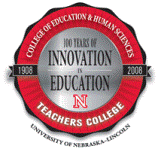Education and Human Sciences, College of

Research and Evaluation in Education, Technology, Art, and Design
Date of this Version
Winter 12-15-2014
Citation
Deng, Q, Friedrich, L, & Trainin, G. (2014) Tech EDGE. Use of New Literacies in Elementary Classrooms Today: A partnership to Enhance Student Learning Through Teacher Preparation and Professional Development. Report submitted to Nebraska’s Coordinating Commission for Postsecondary Education. NE: University of Nebraska-Lincoln.
Abstract
Tech EDGE has been able to capitalize on past funding to create significant impact across multiple public and private schools. Support from UNL’s resources have enabled us to operate far beyond the official end date so we can keep building on our successes and the energy the project provided for school change. We have trained hundreds of practicing and new teachers to integrate technology and while the work is not done it did a lot to boost the capacity in all the participating districts and teacher education programs. We would like to thank the Post Secondary Commission for the generous support in this and previous grants. The data included in the following pages shows the impact the grant has had. The highlights are summarized here:
• The grant carried out all planned activities. Teachers participated in person and through distance technologies.
• Professional development activities, including iPads in the Classroom webcasts and published conference presentations, are open to all Nebraskan teachers through YouTube and iTunesU channels.
• Lessons were also disseminated in local and national conferences.
• Growth in pre-service confidence in technology integration was large.
• Classroom observations showed that teachers planned instruction that included embedded technology skills and effective use of technology.
• Students were observed using ethical practice behavior, high on-task behavior, problem solving, and engagement.
• Teachers were observed using technology skills embedded design, effective use design, and developmentally appropriate design.
• Scores in problem solving and other learning were higher for upper elementary students.
• Problem solving, collaboration and student tool choice are areas for additional focus.
• Teachers are still challenged by the global opportunities possible with new technologies.
• Teachers express need for additional professional development to keep up with new technologies and opportunities that would impact student achievement.
• Coaching was a promising practice pushing pre- and in-service teachers to integrate technologies into classroom learning quickly and thoughtfully.

